
Since January of 2017, I have been working with several people in my Freedom from Procrastination Membership Program who are committed to eliminating needless procrastination from their lives. It has been a pleasure for me to have this opportunity to teach this group how to protect themselves from the negative consequences that procrastination brings.
Whenever I work with procrastinators, I am reminded we each have unique ways of being productive and of getting blocked from being productive. Types of productivity blocks can include:
- feeling like you don’t have any more energy
- feeling like someone else should be helping you more than they have been
- feeling too embarrassed by past mistakes to start over
- feeling like your current project will never end
- telling yourself “What does it matter if it’s delayed one more day?”
- deepening depression
- feeling overwhelmed by the obligations of daily life
- feeling like you are too far behind to ever make any real progress
To tell you the truth, I get a real kick out of doing this work. I empathize with my clients easily because I have been there. I have felt the overwhelm, the exhaustion, the shame, and the feeling of “it’s never-ending.” But I also get to provide my clients with hope and strategies for a different way of living, both of which are important for protecting your day from your impulse to procrastinate.
I provide hope by sharing how I made changes, step-by-step, to shed the excess from my schedule, closet, and thought process. I provide hope by talking about how calm I feel in comparison to how anxious I used to feel in the not-too-distant past. I provide hope by creating a space where people can communicate openly and honestly about what is really going on.
Hopefulness is only one part of the recovery process in working with procrastinators. We need some real and reliable structures to help us move forward as we grow and change.
Some of the strategies I teach my clients include:
- Take action daily. No matter what your purpose is, work on it every day. Taking active action on a daily basis provides us progress and momentum. When we stop for even one or two days, procrastination can step in and turn our opportunities to get things done into another week down the drain.
- Break your projects down into smaller tasks. This is one of my favorite go-to tips for helping procrastinators, including myself. When I’ve got a roomful of items to go through, i.e. my current kitchen cleanout project, I commit to clearing out and reorganizing a small section of the room each day. My commitment to take care of two sets of kitchen cabinets a day is relatively small and therefore feels much more doable than trying to redo my entire kitchen in a single go.
- Give yourself an actual time limit. When we have unstructured time, we can have more difficulty maintaining focus and direction. Setting time limits for yourself can help you remain aware of time and move toward your goal more quickly. Time pressure is a great motivator.
- Take a hard look at the costs of your procrastination. Instead of letting more time go by, assess what you are losing when you procrastinate. Not only do you lose time, but you lose self-confidence and opportunities to grow. Don’t fool yourself into believing your procrastination won’t do you any harm.
- Set up an Emergency To Do List for when times feel really tough. This list includes names of people to call, activities to do, and actions to avoid when you feel you’re about to go into a downward procrastination spiral — the kind where all of a sudden your whole day has been taken away by Netflix or some other form of mind-numbing distraction.
These techniques are great because they are simple and effective. Find your creative flow again by putting them into action.
Never lose faith in your own potential and ability, no matter how stuck you might feel. Your efforts to escape procrastination will be worth the time and energy you spend. Living without the heavy burden of procrastination will lift your spirits, empower your mind, and boost your energy so you can live your life to the fullest.
If you feel you might need some support in implementing the techniques I just mentioned, please consider joining my group coaching program, where I show members how to live free from stress, anxiety, and needless procrastination. You’ll be amazed at how quickly you can kick your procrastination out of your daily life. For more details about the program, go to this page –> Freedom from Procrastination Membership Program.
Related reading: 5 Ways to Get Moving When You are Really Stuck


Thanks for this post, Christine! In these last days, I’ve been struggling a little bit with a chapter I need to finish by the end of this months (actually now as you can see), and I was feeling (and still feel though) this sensation that the project has no end, that no matter the progress I make on one day, there’s always something else to read, to write and so on.
In a similar vein, I feel identify with “what’s the problem if it’s delayed one more day?”. Although I tried to give myself a time limit as point 3 suggests (in this case, my self-imposed deadline was to send my supervisor a draft in advance), I was not able to fulfil that promise and I was feeling really miserable, not just because I was unable to do what I said but also because I knew that I was not being fair enough to my supervisor by giving such a short time.
In all, I know that setting deadlines to ourselves is something that should push us towards feeling less relaxed and gain awareness of our time, however, in practice, it gets really difficult and, in my case, I fall in the “it doesn’t matter if it takes one more day” mental trap.
Hi Cecilia,
Thanks for sharing your current predicament. Without endings, there can be no beginnings. Allow yourself to create some work and then to let it exist as just that. Nothing more, nothing less. Let the time deadline be the absolute deadline and not how you feel about where you have gotten in the work. If you feel miserable, it likely means your work process got away from you. Bring it back with structure, timeframes, and a commitment to let it go. You can always return to it if you need to. Practice being done [and definitely do not read anything more!]
Best,
Christine